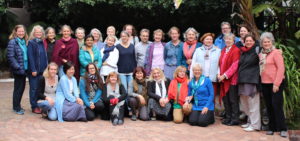The International Association is active wherever colleagues work together on behalf of our shared ideals for the development of the young child. This cooperation takes place through conferences, meetings, working groups, collaborative research projects, training and deepening courses, and the development of resources, as well as through partnerships and sponsorships among colleagues throughout the world. Responsibility for the association’s activities is shared among its council, coordinating group, board, and working groups.
The Council
The Council is the main decision-making body for carrying out the purposes of the association and for developing its educational and cultural goals. The Council also functions as an organ of perception for the questions, needs and tasks of the worldwide movement of Waldorf early childhood education. The Council meets twice each year for several days. It makes decisions about projects, working groups, conferences and other activities, and is responsible to appoint the Coordinating Group and Board and approve the annual budget. Each recognized member association appoints a representative to the council, with a seven-year term of office. Council members serve as links between the colleagues in their own countries and those in the International Association.

Current Council members are: Inneke van Esbroeck (Belgium) – Sara de los Santos (Sweden) – Ursula Dotzler (Austria) – Svetlana Efremova (Russia) – Ulrike Farnleitner (Ireland) – Sucheta Garud (India) – Sigrid Jackstadt (Germany) – Birgit Krohmer (Germany) – Mary-G Häuptle (South Africa) – Susan Howard (North America) – Louise deForest (North America) – Thi Phuong Dung Cao (Vietnam) – Sarah Dickson (East Africa) – Tina Iwersen (Finland) – Sandra Eckschmidt (Brazil) – Shy-Tyng Kai (Taiwan) – Joli Kiss (Hungary) – Janja Kokalj (Slovenia) – Magdalena Kuczora (Poland) – Kathy MacFarlane (New Zealand) – Sono Matsuura (Japan) – Janni Nicol (United Kingdom) – Marelle Tann (Estonia) – Natalia Orlova (Ukraine) – Philipp Reubke (Pedagogical Section) – Gabriela Popescu (Romania) – Rasa Ragauskaite-Driukiene (Lithuania) – Michal Reshef (Israel) – Silvia Rizzoli (Italy) – Tánja Smolková (Czech Republic) – Lourdes Tormes (Spain) – Ae-Young Jeong (Korea) – Aurelia Udo de Haes (Norway) – Heather van Zyl (Australia) – Jacqueline Walter-Baumgartner (Switzerland) – Li Zhang (China) – Ae Rawimas (Thailand) – Hao Bing (China) – Cathy Seiwert (France).
Council members can be contacted through the Member Country Associations on the Home Page.
The Coordinating Group
The Coordinating Group is responsible for managing the business and facilitating the work of the association. There are currently three members of the coordinating group, working on a part-time basis for IASWECE.
Susan Howard works in Amherst, Massachusetts, USA, and is responsible for coordinating membership, training, recognition processes and finances. She can be reached at s.howard@iaswece.org or at 001 413 549 5930
Mary-G Haüptle works in Cape Town, South Africa, and is responsible for research, working groups and projects. She can be reached at mg.hauptle@iaswece.org or 0027 83 495 7525.
Lourdes Tormes works in Madrid, Spain, with the main focus on support for the projects, e-newsletter, collaboration with other organisations and website. She can be contacted at l.tormes@iaswece.org or 0034 653 91 31 99
The Board
The Board carries the legal and financial responsibility for the association. Board members are elected by the Council for terms of three to five years. Board members are also council members. The Board meets several times each year to oversee the preparation of the budget and financial reports, and to act as a speaking partner and mirror for the coordinating group. The current members of the board are:
Tina Iwersen, Helsinki, Finland
Janni Nicol, Cambridge, United Kingdom
Philipp Reubke, Dornach, Switzerland
Jacqueline Walter-Baumgartner, Rheinfelden, Switzerland
Mary-G Haüptle, Cape Town, South Africa
Task force groups, committees and working groups are also established from time to time to address burning issues, engage in collaborative research, or conduct the activities of the association.